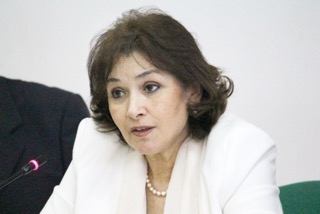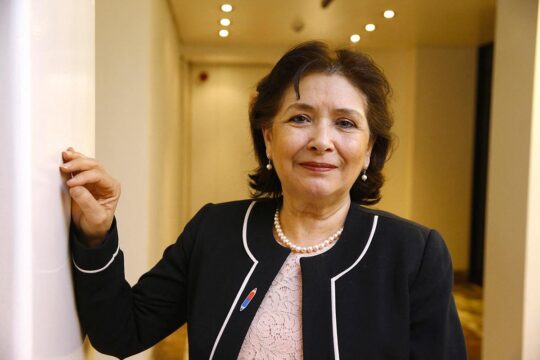Sihem Bensedrine, who was a dissident journalist in the time of ex-President Ben Ali, has since June 9, 2014, been heading Tunisia’s Truth and Dignity Commission. The Commission’s mandate is for four years, renewable once for one year. Because of the stakes it represents – shedding light on the abuses of the past, looking into accounts, responsibilities, reform of the institutions, reparations -- the Truth Commission does not leave anyone in Tunisia indifferent. In this interview, its President gives an overview of progress.
JusticeInfo: It is five years since January 14, 2011, and nearly two years since the Commission was launched in June 2014. Why in all this time has so little been achieved in transitional justice in Tunisia?
Sihem Bensedrine: It is true that in people’s minds the Truth Commission is also responsible for the disappointed hopes of the last five years. On the other hand, many people also say to us: “You are our only hope!” The transitional justice process has certainly been slow getting off the ground. But I am not sure you can say we have achieved little up to now, especially given the dire lack of logistics and resources we had to deal with when we started. The Moroccan Truth Commission started in a beautiful building with 250 staff, but we had to launch our preliminary work in a place that was completely empty. The former head of government gave us only a third of our budget for 2014. As a result, the objectives of the regional bureaux should have been attained a year ago. Despite these difficult conditions, we have managed to put together a management team with eight departments, set up the six committees and receive 27,000 complaints. People often forget that filing complaints requires training the teams and building the necessary software applications. In September, we started hearings of victims behind closed doors. Up to now we have heard 2,800 people in our offices reserved for this. We have also set up two mobile units to go and meet the most vulnerable, the elderly, handicapped and women victims of sexual violence. For 2016, we have set two key priorities. Between now and June, when the deadline for registration of victims expires, we aim to register 40,000 alleged victims of the dictatorship on our lists. Between now and the end of the year, we aim to complete private hearings of all the victims.
JusticeInfo: Many of the victims, including those injured in the Revolution and relatives of the martyrs, have expressed their frustration at a process they perceive as “politicized” and “bureaucratic”. What has the Commission done for victims up to now?
SB: You cannot accuse the Commission of bureaucracy! We don’t even require that victims come themselves to file their testimonies. An ID card brought by family, friends or an association is enough. We have offered people the possibility of filing from a distance, using the same forms as those who come in person. We open our offices on Saturday for those who work during the week and can only contact the Commission at weekends. We nevertheless require the victim to be present in person for the private hearing. In my opinion, frustration comes from the issue of reparations. But without a closed door hearing, we cannot really register and measure people’s expectations. We then need to investigate and cross-check with documents and archives to verify the facts in their files. So out of 27,000 cases registered, we have found that 400 do not fall under the transitional justice mandate. According to the law, reparations come at the end of the process and will be paid in 2017. In the meantime, following a vote in Parliament, we have since February a fund for emergency reparations in the field of health care, which allows us to pay for health care needs of victims. There is a free health care card for the poorest, social insurance cover and a special mattress for those suffering from bed sores. I must say also that, in many cases, just being listened to can be an act of reparation on the part of a State institution, which thus recognizes the victim as such.
JusticeInfo: The Commission’s PR has been marked by long moments of silence, followed by brief appearances in the media by yourself and members of your team. Do you have a communications strategy?
SB: I admit there is weakness here. Communication remains our weak point. We had a lot of difficulty last summer finding a Communications director. The best ones, who work in the private sector, cost too much, whilst the others have gained their experience working in the field of propaganda for the old regime. It is not possible to recycle them in the Commission.
JusticeInfo: Why the delay in public hearings, which could draw media attention and sensitize the public on the importance of the process?
SB: We had a long debate on this, notably with the provisional Body on court justice, which collaborates actively with us. Its experts convinced us that we should start by completing all the investigations on a case before then putting a victim on the spot to reveal the truth about it and the names of suspected perpetrators of human rights abuses. The Commission’s four investigating units, directed by judges, are now completing their cross-checking, verification and closure of their inquiries. In the meantime, we need to prepare the victims psychologically to start public hearings. The first ones are planned to take place soon, I think probably towards the end of March. They will have an educational impact on the public.
JusticeInfo: How far have you got with setting up specialized Chambers to decide on grave human rights abuses?
SB: That’s something on which we have made a lot of progress, especially since the nomination of five magistrates in each of the ten Appeals Courts of the Republic. We are currently drawing up our rules of procedure, which will allow the Commission to coordinate with the specialized Chambers. We are also consulting civil society on this, through our strategic partners: the national Order of Advocates and the magistrates’ associations. It will then be necessary to train the specialized judges in Transitional Justice, with the help of the provisional Body on court justice, UNDP and the office of the UN High Commissioner for Human Rights. We will then transfer our cases to the magistrates of the Special Chambers, whose job will be to pronounce their verdicts, leaving behind some of what they learned before. They will have to refer to new principles, not sanctioning someone systematically, but rather seeking to reveal the truth and find solutions to the heavy legacy of the past.
You said recently that the Commission’s arbitration and conciliation committee, which handles cases of corruption and abuse of public assets, could bring billions into State coffers. What is preventing it from doing so?
SB: This is a committee that is currently handling more than 300 cases. It is part of a process that combines mediation and arbitration. One positive thing is that the State Representative on litigation against the government is coming to our meetings. But if nothing has been concluded, it is because the State has not yet designated someone to represent it at hearings and at the signing of agreements from arbitration. This issue is to be settled by a decree from the Presidency. If the State is not cooperating with us very well when it is accused of economic violations, ironically it is also slow to react when it is seen as victim of corruption and abuse of public funds. I think that in some ministries there is still little understanding of the Commission’s mandate. They still do not see that they can make use of our prerogatives to resolve the problems of the past.
JusticeInfo: The Venice Commission on October 23 expressed its disapproval of the draft law on “economic and financial reconciliation” submitted President Béji Caied Essebssi. Since then, the parliamentary majority has stopped talking about this initiative. Do you think the President has abandoned this project?
SB: I think this issue is closed! I think the people in the President’s office have realized that it is not at all a good idea! After the Venice Commission issued its preliminary Opinion, the Presidency’s lawyers also got to work on the Venice Commission’s recommendations, in other words, revising their copy.
JusticeInfo: What can the Commission do in the face of a worrying trend in Tunisia today, which is to deny that the Ben Ali regime was a dictatorship and bring his men back in strength to the political arena?
SB: We can respond by revealing the truth about the human rights violations committed under the previous regime, by holding public hearings, by holding to account the perpetrators of grave human rights violations. We have already started summoning former senior State officials whose names are mentioned in several cases. The procedure for holding people to account is under way. The locomotive of transitional justice is moving forward. It is moving, and it is on track. We only ask that we can be left to work in peace!






